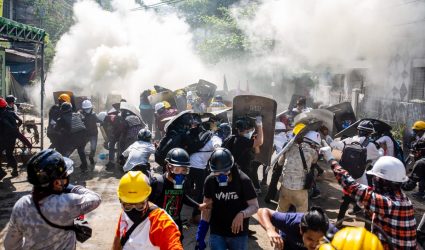Myanmar: military revokes licences of five media outlets in blow to press freedom

(The Guardian) – Myanmar’s military junta has revoked the licences of five media outlets as it seeks to clampdown on independent coverage of anti-coup protests, a major blow to press freedom in the country.
Mizzima, Democratic Voice of Burma (DVB), Khit Thit Media, Myanmar Now and 7Day News have each been ordered to close, according to an announcement on state broadcaster MRTV. It said the companies were “no longer allowed to broadcast or write or give information by using any kind of media platform or using any media technology.”
The outlets have reported extensively on protests over the coup over recent weeks, as well as the brutal response by the security forces. Hundreds of thousands of people have taken to the streets to call for the military to hand power back to the democratically elected government of Aung San Suu Kyi. Police and troops have responded with lethal force, killing more than 50 people. Rights experts warn the military has adopted a “shoot to kill” approach.
On Monday evening, before the junta announced it was to ban several media companies, soldiers and police raided the headquarters of Myanmar Now, a news outlet that scrutinises the Tatmadaw, or military, seizing computers, part of the newsroom’s data server and other equipment.
The offices were evacuated as a precautionary measure on 28 January as talk of a possible coup intensified and were empty at the time, a representative said.
Nearly 1,800 people have been detained during army crackdowns, including dozens of journalists. In one disturbing video shared last week, Kaung Myat Hlaing, a journalist working for DVB in the southern city of Myeik, filmed from his balcony as security forces surrounded his apartment, shouting for him to come down. What sounds like gunfire can be heard in the background. He calls out, urging his neighbours to help him. DVB later confirmed he had been detained.
Six journalists, including the Associated Press photojournalist Thein Zaw, have been charged with violating a public order law for covering the coup. They could be imprisoned for up to three years.
DVB said it was not surprised by the cancellation of its licence, adding that it would continue broadcasting on satellite TV and online. “We worry for the safety of our reporters and our staff, but in the current uprising, the whole country has become the citizens’ journalists and there is no way for military authorities to shut the information flow,” executive director Aye Chan Naing told Associated Press.
Since the coup, protesters have flooded social media with footage from protests, and used Facebook Live to document military crackdowns on peaceful demonstrators. The junta attempted to block social media early in February, but many have evaded the restrictions by using virtual private networks (VPNs). At night, however, when the military conducts raids of homes, the junta routinely imposes a nationwide internet shutdown.
On Monday night, security forces blocked around 200 people from leaving a four-street area in Sanchaung township in the country’s largest city, Yangon, according to the UN rights office. The Associated Press reported that door-to-door searches were carried out, with police searching for protesters who had sought shelter in the buildings. Protesters have since been allowed to leave the area. A rights group told Reuters about 50 people had been arrested in Sanchaung after police searched houses, though checks were still being made.
While the protesters were trapped, the UN secretary general, António Guterres had called for their release “without violence or arrests”.
Guterres’s spokesperson, Stéphane Dujarric, said the secretary general had been following the developments “very closely”, particularly in the township “where hundreds of peaceful protesters have been barricaded inside residential apartment complexes for hours”.
Sharp loud bangs had been heard coming from the area, according to an AFP reporter, although it was not immediately clear if the sounds were caused by gunfire or stun grenades. Repeated screaming was audible in a live Facebook stream.
Guterres also called the occupation of a number of public hospitals in Myanmar by security forces “completely unacceptable,” the UN spokesperson said.
The siege in Yangon came after three protesters were shot dead on Monday. In the northern city of Myitkyina, security forces used teargas and opened fire during street clashes with stone-throwing protesters. “Two men were shot dead on the spot, meanwhile three others including a woman were shot in the arm,” a medic told AFP.
A third protester was shot dead in the town of Pyapon in the Irrawaddy Delta region, an eyewitness and a rescue official told AFP.
Myanmar’s ambassador to Britain, Kyaw Zwar Minn, has voiced support for protesters, calling for the release of Aung San Suu Kyi, who was arrested along with members of her National League of Democracy government, on 1 February.
Unions are seeking to ramp up an ongoing “civil disobedience movement” – a campaign urging civil servants to boycott working under military rule which has already hit state machinery hard.
The impact has been felt at every level of the national infrastructure, with hospital disruptions, empty ministry offices and banks unable to operate.
The junta has warned that civil servants “will be fired” with immediate effect if they continue to strike.

